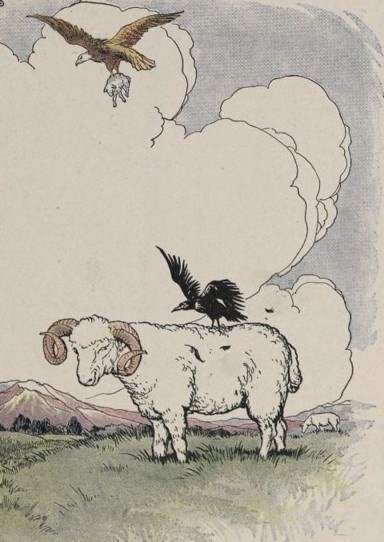PART A_1
Let’s learn vocabulary. Listen and repeat the words and the sentences with your tutor.
PART A_2
| 1. swoop | /swoop/ |
| -to sweep through the air, as a bird or a bat, especially down upon prey | |
| A raven swooped down its prey. | |
| 2. nest | /nest/ |
| -a structure or place made or chosen by a bird for laying eggs and sheltering its young | |
| The farmer found 5 eggs in a nest. | |
| 3. feather | /FETH-er/ |
| -one of the many soft, light things that cover a bird’s body | |
| Peacocks have eye-catching feathers. | |
| 4. fierce | /feers/ |
| -violent in force, intensity, etc.: | |
| A fierce fight broke out in the middle of the town. | |
| 5. vanity | /VAN-i-tee/ |
| -excessive pride in one’s appearance, qualities, abilities, achievements, etc | |
| The movie actor was blinded by vanity. |
PART B_1
Let’s read the story. Please read it aloud, and I will check your pronunciation and intonation.
PART B_2
THE EAGLE AND THE JACKDAW

An Eagle, swooping down on powerful wings, seized a lamb in her talons and made off with it to her nest. A Jackdaw saw the deed, and his silly head was filled with the idea that he was big and strong enough to do as the Eagle had done. So with much rustling of feathers and a fierce air, he came down swiftly on the back of a large Ram. But when he tried to rise again he found that he could not get away, for his claws were tangled in the wool. And so far was he from carrying away the Ram, that the Ram hardly noticed he was there.
The Shepherd saw the fluttering Jackdaw and at once guessed what had happened. Running up, he caught the bird and clipped its wings. That evening he gave the Jackdaw to his children.
What a funny bird this is! they said laughing, “what do you call it, father?”
That is a Jackdaw, my children. But if you should ask him, he would say he is an Eagle.
Do not let your vanity make you overestimate your powers.
PART C_1
Let’s answer comprehension questions. Please answer them based on the story.
PART C_2
| 1. | Which animal was able to seize a lamb? |
| 2. | What did the Jackdaw do? |
| 3. | What did the Shepherd tell his children? |
PART D_1
Let’s discuss the story. Please answer the questions below and express your opinions.
PART D_2
| 1. | Why do you think the Jackdaw imitated the Eagle? |
| 2. | Do you think the Shepherd did the right thing? |
| 3. | If you were of the Shepherd’s children, what else would you ask him? |
| 4. | The fable’s lesson is “Do not let your vanity make you overestimate your powers.” Do you agree with this? Why or why not? |
| 5. | Do you know anyone who is as ambitious as the Jackdaw? Please share. |
REVIEW AND FEEDBACK
Now, let us review the things that you learned in this lesson.
ではこのレッスンで学んだことを振り返りましょう。
(Please give a short feedback on how your student did on your class.)
| Grammar 文法 |
Pronunciation 発音 | Vocabulary 単語 |
Comprehension 理解 |
|
|---|---|---|---|---|
 GOOD GOOD |
文法の誤りはほとんどなく、完全な文章で話すことができる | ほとんどの単語をはっきりと正しく発音することができる | 習った表現を適切に使うことができる | 文章を理解し、質問に正しく答えることができる |
 FAIR |
文法の誤りはあるが、完全な文章で話すことができる | 発音の練習が必要な言葉がいくつかある | たまにミスはあるが、習った表現を適切に使うことができる | 文章を完全に理解するのは難しく、質問に正しく答えられないときもある |
 POOR |
文章で話すのは難しく、単語だけで話すことができる | 発音の練習が必要である | 習った単語と表現を少しだけ使うことができる | 文章を理解するのは難しく、質問に答えるのは難しい |
Parts of this lesson material are based on:
An eBook from The Project Gutenberg.
This eBook is for the use of anyone anywhere at no cost and with almost no restrictions whatsoever. You may copy it, give it away or re-use it under the terms of the Project Gutenberg License included with this eBook or online at www.gutenberg.org
An eBook from The Project Gutenberg.
This eBook is for the use of anyone anywhere at no cost and with almost no restrictions whatsoever. You may copy it, give it away or re-use it under the terms of the Project Gutenberg License included with this eBook or online at www.gutenberg.org